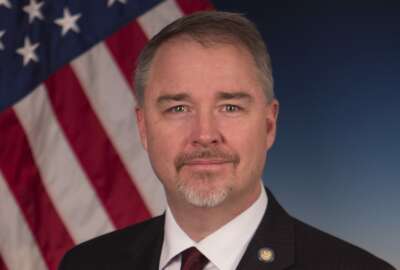Agencies could have some extra cyber defenses by the end of the year
In today's Federal Newscast, the federal government could have multifactor authentication and encryption technologies fully deployed across its networks within six...
To listen to the Federal Newscast on your phone or mobile device, subscribe in PodcastOne or Apple Podcasts. The best listening experience on desktop can be found using Chrome, Firefox or Safari.
- The USPS said it’s started the fourth quarter of the fiscal year with strong on-time delivery. The agency reports delivering more than 90% of first class mail on time for the first week of July. That’s a more than 3% increase compared to how it began of the third quarter of this fiscal year. Under its 10-year plan, USPS is looking to reach a goal of 95% on-time delivery, but will achieve this goal in part by relaxing service standards for nearly 40% of first-class mail.
- For your good news file, the Department of Housing and Urban Development’s procurement shop successfully navigated the pandemic, awarding contracts and modifying agreements with contractors to let them continue to work remotely. A new report from the HUD inspector general found during a limited review of contracts, the acquisition office was telework ready and could perform and review procurement activities through its online systems, which minimized challenges. HUD also minimized the danger of working in the office for contractors and the changes resulted in little or no disruption or cost increases.
- A new set of grades is out measuring how agencies forecast procurement needs. The U.S. Agency for International Development received the first-ever perfect score for meeting all 15 attributes of a successful business forecast for industry. The Professional Services Council released its third annual scorecard where USAID was one of 15 agencies receiving high marks. PSC said USAID goes above and beyond to provide accurate, up-to-date information to its industry partners. Meanwhile nine agencies, including the Defense Logistics Agency, the Naval Supply Systems Command and Marine Corps Systems Command received poor marks for their communication efforts. PSC reviewed the procurement forecasts of 69 agencies and found some progress, but several documents remained incomplete, inconsistent or included out-of-date information.
- The Defense Department is interested in deep space communications for offensive and defensive purposes. The Pentagon recently awarded a small contract to the Rhea Space Activity to create a spacecraft that will act as a quickly repositioning space antenna. Dubbed SCORPIUS, the satellite could help DoD as it begins thinking about putting objects past the moon and even further into space.
- A new website will connect the Air Force and Space Force with potential industry partners to bring in more innovation. The Air Force Research Laboratory built the Air and Space Force Tech Connect website to provide innovators with access to events, opportunities and feedback. Industry partners can use the site to submit ideas and technology to subject matter experts in the services. The initiative is part of the Air Force’s Science and Technology 2030 Strategy, which lays out a plan for upgrading Air Force and Space Force technologies and research management.
- The Defense Department is reaching out to the public to hear concerns about “forever” chemicals that have detrimental effects. The Pentagon held its first-ever online forum on PFAS chemicals in what will be a series of engagements to better communication and transparency around cleanup efforts. The chemicals are used to put out aircraft fires, but have been shown to infiltrate into drinking water and have carcinogenic effects. The Defense Department said it’s reaching the 20% mark in conducting assessments of PFAS use on bases. There are nearly 700 locations that potentially used the chemicals.
- A bill in Congress would set up a consortium to help the Department of Homeland Security address cybersecurity risks and incidents. The Senate passed the National Cybersecurity Preparedness Consortium Act, which would assemble a group of nonprofit entities and academic institutions to provide DHS with technical assistance for cybersecurity capabilities. Members of the consortium would span different geographic regions, and would work with DHS to train state and local governments on cybersecurity prevention and incident response. Sen. John Cornyn (R-Texas) introduced the legislation, which has no companion bill in the House.
- Agencies could have some important cyber defenses in place by the end of the year. The federal government could have multifactor authentication and encryption technologies fully deployed across its networks within six months. That’s according to a senior Biden administration official speaking with reporters about attributing a major hacking campaign to China over the weekend. The administration has pushed for federal cybersecurity improvements after taking over in the immediate wake of the SolarWinds breach. Agencies are also prioritizing endpoint security, improved logging practices, cloud migration and upgraded security operations centers, according to the official.
- The Department of Energy is handing out $28 million to develop software that will run on some of the world’s fastest computers. The funding will support five research projects developing advanced software for DOE’s supercomputers. The awards were made through the department’s Scientific Discovery through Advanced Computing program. DOE said the projects will help advance quantum information sciences and investigate chemical reactions for clean energy applications.
- Many agencies are embracing more telework. But those arrangements spark new questions about old workforce policies. The Office of Personnel Management said it’s fielding questions about locality pay and travel costs as agencies consider new remote work arrangements. They’re considering whether current travel guidance is a disincentive for agencies who want to offer full-time telework but have their employees occasionally travel to the office. Agencies had until yesterday to submit new reentry and workforce plans to the Office of Management and Budget for review. (Federal News Network)
- The Coast Guard is likely using inaccurate telework data to make decisions about its workforce and IT investments. The Coast Guard expanded telework opportunities to more employees during the pandemic, like most agencies. But it relies on employees to self report their telework statuses. The Government Accountability Office said this data is unreliable. And it’s unclear whether the agency is auditing employee telework agreements. The Coast Guard did manage to vaccinate nearly two-thirds of its personnel during a four-month period earlier this year.
- A key Republican negotiator said a plan to beef up the IRS’s enforcement operations is off the table for $1 trillion infrastructure plan. The Biden administration proposed giving the IRS up to $80 billion over the next 10 years to shrink a widening tax gap between what taxpayers owe and what the agency collects. But Sen. Rob Portman (R-Ohio) told CNN that provision is no longer part of the bipartisan package. “In terms of IRS reform, or IRS tax gap which was in the original proposal, that will no longer be in our proposal.” Portman said Senate Democrats will still to pursue IRS funding as part of a separate $3.5 trillion spending package that doesn’t have Republican support.
Copyright © 2025 Federal News Network. All rights reserved. This website is not intended for users located within the European Economic Area.
Eric White
Eric White is news anchor and Federal Drive producer at Federal News Network.
Follow @FEDERALNEWSCAST






